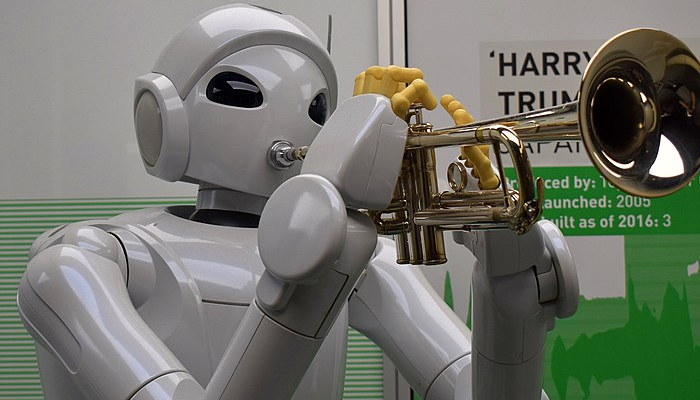Robots
Where can I find information about robots?
(Years 7-10)

Image: Swedish National Museum of Science and Technology (Tekniska museet) in August 2019 by BugWarp on Wikimedia Commons. CC BY 4.0. Image cropped.
Entry last updated: 9/02/26
Introduction
Robots are machines built to help people. The word 'robot' comes from the Czech word robata which means forced labour. When most people imagine a robot they think of something that looks and acts like a human but most robots look nothing like a person. They also only act in the way in which they have been programmed to do so.
General websites
Robots are useful machines that can be programmed to help humans do repetitive, difficult, and/or dangerous work. The science of making robots is called Robotics. Check out these websites to discover what robots are, how they work, and what they are used for.
Explain that Stuff has information about how robots experience the world around them through something similar to our own senses of vision, hearing, smell, touch, and taste.
Enter robots into the search area.
Although the search takes you to Google, it only searches the site.
Select the article called How do robots work?
Tips: Websites with .com or .co in the address can have good information, but you need to assess their reliability. Check the About us link on the website if you can find one. That can tell you the company’s mission and values.
This is an educational show for high school and university level students.
Search for 'robots'
Choose a video to watch eg How Engineering Robots Works: Crash Course Engineering #33 or Robots: Crash Course Computer Science #37.
Tips: Search words, or keywords, are the most important words in our question. You can leave out small words like ‘the’ and ‘of’ and just choose the main ones, eg Robots. We can always change our keywords or add more if we need to.
This website is a New Zealand science resource organised by topics and concepts.
Enter 'robots' into the search area.
This site has articles and videos about a range of different uses for robotssuch as horticulture, milking, and drones.
Tips: Websites that have .org or .net in the address can have good information, but you need to assess how reliable it is. Check the About link on the website, if you can find one. That can tell you what the organisation’s mission and values are.
Khan Academy is an educational site filled with articles and videos on lots of topics in science, math, history, computers and more.
Enter 'robotics' into the search area.
Select the article
Watch the videos to make a selection of robots.
EPIC resources
EPIC is a collection of reliable databases covering lots of different topics. It’s put together especially for New Zealand school students. You may need a password to access them.
This is one of the EPIC resources. EPIC is a collection of reliable databases covering lots of different topics. It’s put together especially for New Zealand school students and helps to answer questions like this.
Select your learning level - Primary, Middle, or Secondary (you can always change this later).
Enter 'robots' into the search area and select the magnifying glass.
Select the article called Robot.
This EPIC resource is full of science information for students covering a wide range of topics, including robots and robotics.
Go to Browse Topics.
Look for Robotics.
These topic pages have a good Overview and link to other reference articles, videos, news, and more.
Another EPIC databases. It covers lots of different topics from the arts to sciences. It also has information about robots and robotics.
Select Browse Topics.
Narrow the topics by selecting Science & Health from the drop down menu.
Select Robots and Robotics.
Read the overview or you can look at articles, videos, images and more.
Check out the Related Topics at the bottom of the page.
Tips: To use the EPIC resources, you need a password from your school librarian. Or chat with one of our AnyQuestions librarians to help you online. Some EPIC databases may also be available through your public library.
Books
There are many books that have been written about robots - check out your local public or school library to see what they have!
Here are some recommended titles:
Robots, gadgets, and artificial intelligence by Tom Jackson.
Incredible robots by Warren Singer.
Could robots rule the world?: discover the science behind robotics by Eliza Jeffery.
Robotics by Kate Peridot.
SCIS no: 1870182


